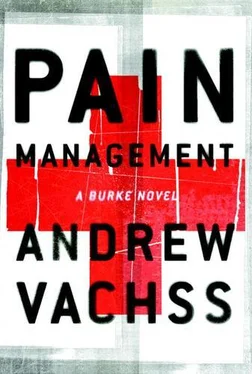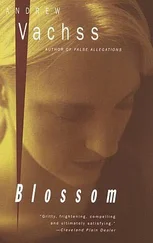“A maid? Kevin would never allow us to have a maid. That would be exploitation of—”
“A housekeeper, then? Someone who comes in once a week to help you with the heavy cleaning?”
“No. I do everything myself.”
“Must be a lot of work.”
She clasped her hands across her stomach. “Well, I don’t want you to get the wrong impression. The girls are very helpful. And Kevin does his share, too.”
I got it. This Kevin was Alan-fucking-Alda to the third power.
The closet doors were wood slats; they opened accordion-style. Inside, it looked like a sixties revival—long dresses in flower prints, platform shoes and clunky boots, dozens of pullovers, even an old army jacket with the peace sign hand-drawn on its back in black Magic Marker.
A guitar case stood alone in a corner, propped wide open to display its torn purple plush lining, as if to mock the searchers it knew would be coming.
The bureau was so old it had glass pulls on the drawers. It was nearly full, all neatly arranged—underwear, pajamas, T-shirts, socks.
I moved over to the bay window, checked it out. The large center portion was fixed in place, but the smaller panes of glass on either side could be opened by a little crank. I turned one experimentally. The opening was big enough to let someone in. Or out. I looked down. It was maybe a fifteen-foot drop into a lush pad of grass surrounded by trees. The backyard had no fence.
“The garage is on the other side of the house from here?” I asked.
“Yes. It’s attached. With an apartment over it.”
“Apartment? You have a tenant?”
“Oh no,” she said, as if I had asked her if they kept space aliens in the attic. “Kevin uses it for a studio. Like a home office.”
“Hmmm . . .” I muttered, to give her the impression that I was working on a thread. I walked out of Rose’s room, got down on one knee, took a sight line to the bay window, nodding to myself.
“What are you—?”
“What’s down the hall?” I interrupted her.
“That way? Just Daisy’s room and a guest room. Our room, our bedroom, I mean, and Kevin’s den, and . . . well, there’s a whole separate section, but it’s on the other side of the stairs as you go up.”
“Is there a side door off this floor?” I asked, moving down the hall, trailing my conversation behind me.
“No. There’s only the staircase. The way we came up,” she said, not quite catching up to me, but staying pretty close. By then, I’d reached the end of the hall and gotten what I wanted—a glance into Daisy’s room. It looked like someone had been searching for a lost coin, using a backhoe. I made my way back to Rose’s room, rubbing my chin like I was contemplating something.
“Would you mind leaving me alone up here for a while?” I asked the woman. She opened her mouth, but no sound came out. “It’s going to sound silly,” I said, apologetically, “but I like to get a . . . sense of the place where the . . . person involved lived. I’m no psychic or anything, but, sometimes, I can pick up a clue to the person’s essence.”
“I don’t see why I can’t—”
“Oh, you’re welcome to stay,” I lied. “You just have to keep perfectly still, all right?”
I turned my back on her, sat down on the woven-rag rug in the middle of the room, threw my legs into a reasonable approximation of the lotus position, and closed my eyes.
It took her less than five minutes to clear out. I kept my eyes closed, waiting. I didn’t know how much time I’d have until her husband showed up. Or even if my hunch would play out.
“What are you doing?” the voice said.
“I’m looking for Rose,” I told Daisy.
“How can you look for anything with your eyes closed?”
“I think you know,” I told her.
“You’re weird,” she said.
I sat quietly, counting to a hundred in my head. Then I asked, “Do you write songs, too, Daisy?”
I felt the disruption of air as she ran out of the room.
When I was sure Daisy wouldn’t be coming back, I got up and went over to the telephone. On first inspection, it had looked old, but the wiring turned out to be modern. And the modular jack housed a splitter, so Rose could choose between the Internet and a regular call off a single line. The line itself was at least a dozen feet long, neatly folded over and held together by a plastic twist-tie. I measured with my eye. Yeah, it could reach the bed, easily.
I picked up the phone, pulled one of the comics out of the middle of the pile underneath it, and stuffed it into my jacket.
Rose’s bathroom was as immaculately organized as her bedroom. And sparkling clean. But it was a beat off—something . . . dishonest about it. I prowled the medicine cabinet and the flush-mounted linen closet. Slowly, the way you do when you’re looking for what isn’t there.
I didn’t expect Luvox and Lithium, or lamb-placenta rejuvenation face cream, any more than I expected a plastic-wrapped pistol in the toilet tank. But no anti-acne stuff? No aspirin? No shampoo or conditioner in the shower, either. The sink was ancient white enamel, heavily chipped. It was set into the top of a wood cabinet. I knelt, opened the cabinet. Lots of cleaning supplies, but no toilet paper.
And no matter where I looked, I couldn’t find a single box of napkins, pads, tampons . . . nothing.
I went back into the bedroom, looking for two things. When I couldn’t find the backpack, I figured I knew where the other thing was, too.
I came downstairs and spent the next hour or so listening to the woman ramble on about not much of anything. Her chemical eyes were a little more toxic than before, but her speech was as flat and unemotional as it had been from the beginning.
Daisy stuck her head around the corner twice, but darted away each time I shifted position.
I was glancing out the front window when a burgundy Volvo P1800 pulled up. It must have been thirty years old, but it sparkled like a new jewel, even in the evening’s soft light. As the driver waited for the garage door to open, I could see the little Volvo had the squared-off, mostly glass back that turned the close-coupled coupe into a ministation wagon. Maybe the husband liked his toys practical.
He was inside the living room in a minute, reaching down to shake hands with me. Tall and thin, with a thick mop of shaggy brown hair and a heavy mustache. Not one thing about his appearance disappointed me until he turned his head to say something to his wife and I noticed he wasn’t sporting an earring.
“She told us she was sleeping over at her friend Jennifer Dryslan’s house,” he told me. “That was a Friday night, the first weekend after school let out for the summer. We didn’t expect to see her until sometime Sunday evening.”
“Did she call or anything during the weekend?”
“No. But that wasn’t unusual.”
“Are you sure she didn’t call? Or that you just didn’t speak to her?”
“There was nothing from her on the answering machine,” he said, choosing his words like he was in court.
I didn’t ask him where Daisy had been that weekend, or whether they’d ever questioned her about a message. Instead, I said, “Did it turn out that Rose spent any time at Jennifer’s that weekend?”
“Jennifer’s parents say no.”
“What about Jennifer herself? Did she say Rose asked her to cover in case anyone called?”
“She said Rose never said a word to her about any of it.”
“Okay. What about the note?”
“We already told your . . . associate,” the husband said. “We figured if the police saw what Buddy wrote they wouldn’t even look for her.”
“Buddy?”
“That’s my husband’s name for her,” the woman said. “Her name is Rosebud. It was kind of half for each of us. I call her Rose; Kevin calls her Buddy.”
Читать дальше











